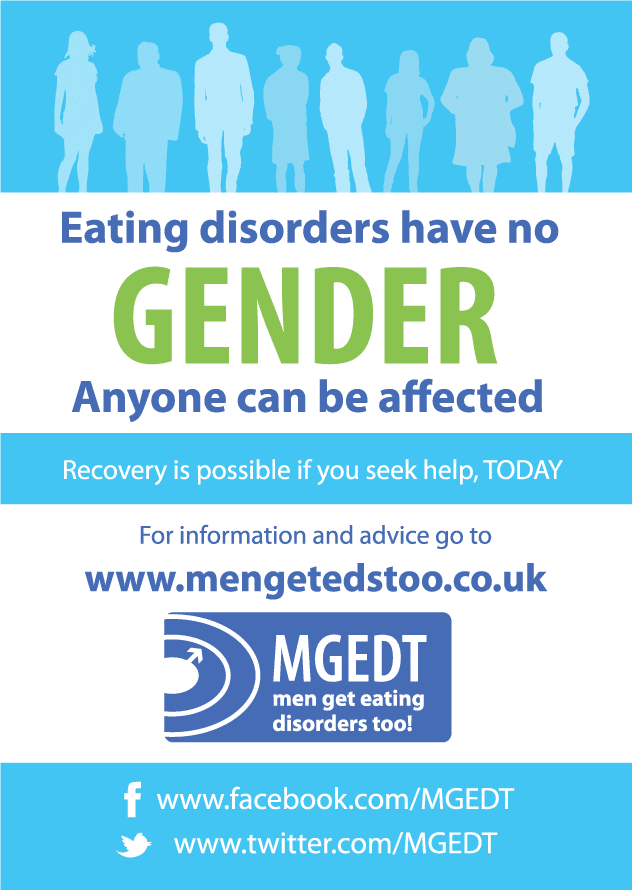Eating disorders are not something we generally associate with men, there is a huge stigma attached if you do have an eating disorder and it’s not an issue frequently discussed. So I was so pleased to come across the Men Have Eating Disorders Too (MGEDT) charity. I was even happier to find they had a conference running within travelling distance for me. So off to Brighton I went. Below are some of my take home points.
The prevelance of ED in men is 40%, this is a huge statistic and I certainly don’t find this in my clinical practice which suggests there are men with ED who are not seeking help. A recurring theme throughout the day was the lack of specific treatments and treatment pathways for men. Services are aimed at treating females not males.
Gender differences mean that there needs to be a different approach to treat men. Therapy, group work and literature all needs to be adapted. One talk was looking at whether we need a specialist inpatient unit for men. Rather than fitting men into a standard ED unit, which can lead to them feeling isolated and like they stick out, how about providing a place specficially set up to treat and help them? It’s an interesting question and I can really see the benefits of doing this.
Back to the gender differences that came out over the day. These show how our current society can lead to incorrect beliefs and values that are unhelpful and can perpetuate an eating disorder. Have a think about whether any of these are core beliefs you hold.
Incorrect Core Beliefs/Assumptions:
- THE BELIEF: Eating disorders are something only women get, so I am less of a man if I have one. Sexuality: eating disorders are primarily a female issue so there can be a thought that if you are male with an eating disorder you are less of a man…… or you are homosexual as gay men are usually more concerned with their weight and shape. The statistics actually show that this is not true, most men with eating disorders are not gay and a lot of men have an eating disorder it is just not talked about often.
- THE BELIEF: If I have an eating disorder I am weak. Male Identity – the image of a man being strong, muscular and able to cope. Having an eating disorder makes you vulnerable, it breaks you. Asking for help can be the hardest thing to do. It can therefore be hard to seek help.
- THE BELIEF: Men have to look a certain way. Body Image – over the years the media stereotype has changed to one of a man being muscular with broad shoulders, a large chest and a small waist. Not a very achievable look of course. Often we see the female stereotype and not the male one.
- THE BELIEF: Men eat and drink a certain way, I need to do this to fit it. Male eating habits – it is seen as ok for men to eat large portions and overeat which can make binge eating acceptable. Certain foods and drinks are seen as more “manly” – beer and red meat for example. What if you don’t actually like those foods or are not the kind of man who likes going to the pub for a pint?
- THE BELIEF: Real Men don’t cry, express emotion or talk about how they feel. Men don’t always like to talk about their feelings – again this can be linked to not wanting to be seen as vulnerable as this is a sign of being a girl or being weak. So it can make it even harder for a man to step out and seek help. Whereas actually we know that talking about your feelings really works and helps.
Men come in all kinds of shapes and sizes, like all kinds of foods, can love to express their emotions and are all INDIVIDUAL. Don’t be afraid to be the man you were made to be. Seek help if you need it, therapy is an amazing tool.
If you are a professional be aware, there are more men out there with eating disorders than you may think.
For posters and resources see the Men Get Eating Disorders Too website.
